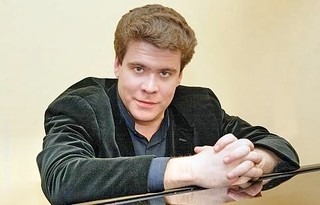|
Back
Volcano in the Room New York
Isaac Stern Auditorium, Carnegie Hall
06/15/2014 -
Josef Haydn: Piano Sonata in E-flat Major, Hob. XVI: 52
Robert Schumann: Carnaval, Opus 9
Peter Ilyich Tchaikovsky: Dumka in C Minor, Opus 59 – Méditation, Opus 72, No. 5
Sergei Rachmaninoff: Preludes in G Minor, Opus 23, No. 5 & in G-sharp Minor, Opus 32, No. 12 – Piano Sonata No. 2 in B-flat Minor
Denis Matsuev (Pianist)

D. Matsuev (© Courtesy of the Artist)
If fingers, wrists and arms were people, Denis Matsuev would be accused of criminal exploitation. Those fingers don’t dash over the keys like an ice-skater: they pound down like rocks falling from the mountains. His wrists and arms don’t swerve from their joints, they seem to detach themselves at times to get to the right notes at the right time.
I don’t know Mr. Matsuev personally, but his musical egocentricity is dazzling. Not always dazzling in the right way, for he is rarely a subtle pianist, but amazing nonetheless. And while his German music in the first half of yesterday’s program was questionable, there was no question whatsoever that music of his native Russia reach down into the core of his country.
No, change that. Make it the volcanic core of his particular planet.
This was the concert he was supposed to have given in January, but a case of pneumonia caused a cancelation, Perhaps to make up for that postponement, Mr. Matsuev didn’t enter, bow and thank the full-house audience for attending. He strode onstage, his fingers pounded out the first chord of the Haydn–a good start for a showpiece Haydn needed for his new Broadbent piano–and dashed through the outer movements with the Titanic fury of a late Romantic composition.
One could worry about the Schumann Carnaval, for a man of his strength and–dare I say it?–daring might muddle parts of it, might burn through the most delicate Schummanesque characters. To a great degree this was true. Mr. Matsuev pays no attention whatsoever to his audience (latecomers were still coming to their seats when he started to play), he ran through the sections with ferocity, with velocity, and, during the quieter moments, gave only momentary indication that he was playing the work of a most sensitive composer.
Few in the audience objected to this playing. What I felt missing was not only breadth, but breathing. Yet I doubt if Mr. Matsuev was pushing for audience applause. I felt this was perhaps the only way he can perform, with utmost energy, with the most tumultuous sound, with pedaling as if these were the last pedals in the world and he had to use them to their extremis.
The second half brought him home, to Russia. After the first two works, somebody in front of me whispered that he played Rachmaninoff as it was Tchaikovsky. Bingo! Matsuev had reversed the program and played the two Tchaikovsky pieces before the Rachmaninoff. This time, he didn’t rush, didn’t need to show off, for he played with such full sounds, with such relaxation, with such dancing joy (the Cossack dance in Méditation was delicious) that it gave new light to the somber old composer.
He finished with Rachmaninoff: two familiar preludes, and then a most unfamiliar Second Sonata.
The Sonata itself is well known, but most composers perform the longer original version. Rachmaninoff decided to shorten it considerably. His friend Vladimir Horowitz had performed it with such passion, such violence that Rachmaninoff felt the work didn’t need such a reading, so he brought it down to the essentials.
That didn’t strop Denis Matsuev, who offered the 18-odd minutes with as much emotion as he could summon up. In the movement titled, in Rachmaninoff’s English “Not Allegro”, Mr. Matsuev could have played any tempo he wanted. (How about “Allegro vivace?” Or “Largo”?), but he took his time, he breathed out the melody, and finished with the same kind of tumult–and let’s face it, after two hours, a very likeable tumult, for which his fingers, wrists and arms were created by a very Divine Providence.
****
CODA: Did a pianist who was all business have time for an encore? Absolutely not. Not an encore, but six encores. Music from Tchaikovsky’s The Seasons, played with the concentration of Brahms. A sombre Sibelius, a stirring Liszt Transcendental Etude, more Rachmaninoff, and then Liadov’s Music Box. Here was the Matsuev of total control. The music box winding down were fingers in the most delicate retards, with the last note a significant sixteenth-note rest after the last chord. Finally, it was Matsuev the jazz artist. I use the term artist without reservation. The melody was Billy Strayhorn’s Take the ‘A’ Train, though we didn’t know it through the meandering. When he got to the tune, the Oscar Peterson technique turned into Dave Brubeck improvisation to a whirlwind improv on the cusp of free jazz, back to the original–but always somehow retaining both the rhythm and the feel.
Harry Rolnick
|